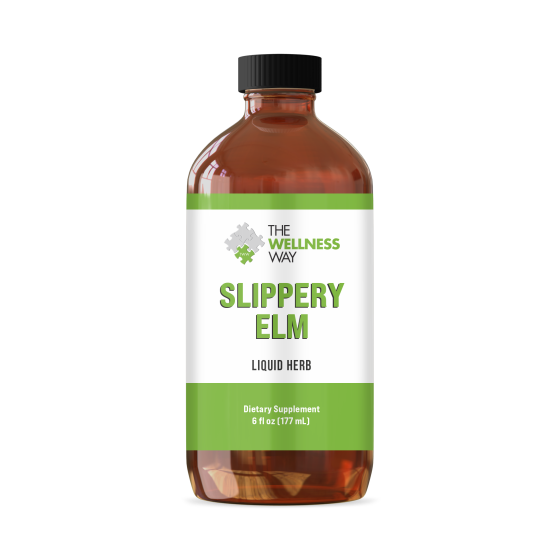Slippery Elm (Liquid Herb)
Slippery Elm (Ulmus rubra) is a species of elm tree native to North America, primarily found in the eastern United States and parts of Canada. The bark of the Slippery Elm tree is one of its distinguishing features and is often the most sought-after part for medicinal purposes. The inner bark, which is smooth and mucilaginous when mixed with water, is the part used for health purposes.
Slippery Elm has been used for centuries by Native American tribes and early settlers for its medicinal properties. The interior bark of the tree becomes slippery when chewed, which gave it its name. The slippery texture provides this herb with the soothing benefits it's known for. Traditional uses include digestive upset, sore throats and coughs, and skin conditions when applied topically.
Slippery Elm bark contains many active constituents, including mucilage, polysaccharides, cellulose, lignin, flavonoids, coumarin, tannins, and vitamins and minerals.
Slippery Elm has been shown in scientific studies to:
*These statements have not been evaluated by the Food and Drug Administration. This product is not intended to diagnose, treat, cure, or prevent any disease. For educational purposes only.
Slippery Elm Infosheet
Bottle contains 6 fl oz (177ml)
Slippery Elm (Ulmus rubra) is a species of elm tree native to North America, primarily found in the eastern United States and parts of Canada. The bark of the Slippery Elm tree is one of its distinguishing features and is often the most sought-after part for medicinal purposes. The inner bark, which is smooth and mucilaginous when mixed with water, is the part used for health purposes.
Slippery Elm has been used for centuries by Native American tribes and early settlers for its medicinal properties. The interior bark of the tree becomes slippery when chewed, which gave it its name. The slippery texture provides this herb with the soothing benefits it's known for. Traditional uses include digestive upset, sore throats and coughs, and skin conditions when applied topically.
Slippery Elm bark contains many active constituents, including mucilage, polysaccharides, cellulose, lignin, flavonoids, coumarin, tannins, and vitamins and minerals.
Slippery Elm has been shown in scientific studies to:
*These statements have not been evaluated by the Food and Drug Administration. This product is not intended to diagnose, treat, cure, or prevent any disease. For educational purposes only.
Slippery Elm Infosheet
Bottle contains 6 fl oz (177ml)
Slippery Elm (Ulmus rubra) is a species of elm tree native to North America, primarily found in the eastern United States and parts of Canada. The bark of the Slippery Elm tree is one of its distinguishing features and is often the most sought-after part for medicinal purposes. The inner bark, which is smooth and mucilaginous when mixed with water, is the part used for health purposes.
Slippery Elm has been used for centuries by Native American tribes and early settlers for its medicinal properties. The interior bark of the tree becomes slippery when chewed, which gave it its name. The slippery texture provides this herb with the soothing benefits it's known for. Traditional uses include digestive upset, sore throats and coughs, and skin conditions when applied topically.
Slippery Elm bark contains many active constituents, including mucilage, polysaccharides, cellulose, lignin, flavonoids, coumarin, tannins, and vitamins and minerals.
Slippery Elm has been shown in scientific studies to:
*These statements have not been evaluated by the Food and Drug Administration. This product is not intended to diagnose, treat, cure, or prevent any disease. For educational purposes only.
Slippery Elm Infosheet
Bottle contains 6 fl oz (177ml)



